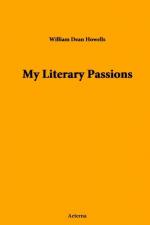But for the moment it appeared to me a tremendous crisis, and I listened as the minister of justice read his communication, with a thrill which lost itself in the interest I suddenly felt in the plundered author. Those facile and brilliant phrases and ideas struck me as the finest things I had yet known in literature, and I borrowed the book and read it through. Then I borrowed another volume of Macaulay’s essays, and another and another, till I had read them every one. It was like a long debauch, from which I emerged with regret that it should ever end.
I tried other essayists, other critics, whom the machinist had in his library, but it was useless; neither Sidney Smith nor Thomas Carlyle could console me; I sighed for more Macaulay and evermore Macaulay. I read his History of England, and I could measurably console myself with that, but only measurably; and I could not go back to the essays and read them again, for it seemed to me I had absorbed them so thoroughly that I had left nothing unenjoyed in them. I used to talk with the machinist about them, and with the organ-builder, and with my friend the printer, but no one seemed to feel the intense fascination in them that I did, and that I should now be quite unable to account for.
Once more I had an author for whom I could feel a personal devotion, whom I could dream of and dote upon, and whom I could offer my intimacy in many an impassioned revery. I do not think T. B. Macaulay would really have liked it; I dare say he would not have valued the friendship of the sort of a youth I was, but in the conditions he was helpless, and I poured out my love upon him without a rebuff. Of course I reformed my prose style, which had been carefully modelled upon that of Goldsmith and Irving, and began to write in the manner of Macaulay, in short, quick sentences, and with the prevalent use of brief Anglo-Saxon words, which he prescribed, but did not practise. As for his notions of literature, I simply accepted them with the feeling that any question of them would have been little better than blasphemy.
For a long time he spoiled my taste for any other criticism; he made it seem pale, and poor, and weak; and he blunted my sense to subtler excellences than I found in him. I think this was a pity, but it was a thing not to be helped, like a great many things that happen to our hurt in life; it was simply inevitable. How or when my frenzy for him began to abate I cannot say, but it certainly waned, and it must have waned rapidly, for after no great while I found myself feeling the charm of quite different minds, as fully as if his had never enslaved me. I cannot regret that I enjoyed him so keenly as I did; it was in a way a generous delight, and though he swayed me helplessly whatever way he thought, I do not think yet that he swayed me in any very wrong way. He was a bright and clear intelligence, and if his light did not go far, it is to be said of him that his worst fault was only to have stopped short of the finest truth in art, in morals, in politics.




